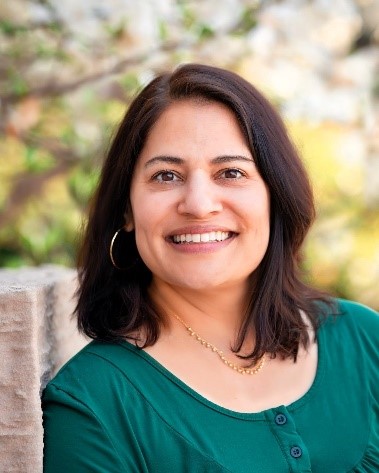The pride in the Asian Pacific Islander Desi American/Asian, or APIDA/A, community is evident by the outpouring of messages and calls to Swapna Hingwe, the newly appointed director of Michigan State University’s Counseling and Psychiatric Services, or CAPS. “Special and powerful” messages of congratulations from student groups and other members of the community mark the significance of Hingwe’s appointment in September as the first APIDA/A woman to lead the department and the first APIDA/A person to lead in MSU’s student mental health services. “You see APIDA/A representation in higher education and medicine but it’s less common to see representation in the mental health fields, rarer still to have an APIDA/A woman in a leadership role,” Hingwe said.
A child of immigrants who first came to the United States to attend MSU, Hingwe is a lifelong Spartan. She is a graduate of the Michigan State University College of Osteopathic Medicine who completed her psychiatric residency with MSU’s Department of Psychiatry, earned a master’s degree in counseling psychology from MSU, and is a proud MSU Honors College alumna. Hingwe is a board-certified psychiatrist with the American Board of Psychiatry and Neurology. Hingwe’s work centers around mental health equity for historically underserved student populations on campus, integrative psychiatry, and eating disorders.
“Mental health work is about inclusion,” said Hingwe. “How do we help students feel safe in bringing their identities and experiences to campus and center students on the margins?”
For Hingwe, mental health equity is about breaking down barriers and addressing individual, familial and social stigmas surrounding mental health while reducing costs to services, improving accessibility for all students and training staff and faculty to be culturally humble and responsive.
“All of these things advance belonging and inclusion for all students. The goal with mental health equity work is to create an environment where every student has the opportunity to maintain and improve their mental health and well-being,” Hingwe continued. “The emphasis is all about fostering an inclusive and supportive campus culture that recognizes the diverse mental health needs of all students. That’s how we work to create an environment of belonging for students to thrive academically and personally.”
Hingwe is the chapter author of “Mental Health Considerations for Black, Indigenous, and People of Color: Trends, Barriers and Recommendations for Collegiate Mental Health,” in the 2021 book “College Psychiatry: Strategies to Improve Access to Mental Health.” She specializes in working with students of color, international students and LGBTQIA2S+ students.
“Mental health work is social justice; it is diversity, equity, inclusion and belonging. It’s important to meet these students where they are to understand their challenges, struggles and aspirations,” she said.
In her new role, Hingwe hopes to not just create programs for students but to include them, especially students of color, international students and LGBTQIA2S+ students in the development of resources and ongoing programs. Hingwe also stresses the importance of using trained peer supporters, as students can often be receptive to suggestions to seek help and services from their peers.
“What are the unique needs for student communities, how do we cultivate safe spaces and places for them, and how do we tailor communication that resonates with these student populations?”
Hingwe will report to Leigh Norwood, inaugural executive director of Mental Health and Trauma Support Services, or MHTSS. University Health and Wellbeing, or UHW, has recently started taking an integrated approach to mental health, with Counseling and Psychiatric Services, the MSU Employee Assistance Program and the Center for Survivors all reporting under the MHTSS umbrella.
“Dr. Hingwe is a strong advocate for our students and is a valued leader within our campus community,” said Alexis Travis, assistant provost and executive director of UHW. “I’d like to thank Dr. Hingwe for serving as interim director of CAPS and I’m thrilled to welcome her into this permanent leadership role where she will continue to lead with empathy and care for all of our students.”
Hingwe was recently recognized as an Innovative Leader by the MSU Women of Color Community. She has also served as a leader with organizations across campus, including the Inclusive Campus Initiative Leadership Advisory Board and the JED Campus Initiative, which is a program through the JED Foundation, a leading organization dedicated to young adult mental health. She served as the interim director of CAPS for six months before advancing to director.
Hingwe also facilitated the “From Isolation to Inclusion” series in partnership with the Black Faculty, Staff and Administrators Association and Women of Color Community to foster connections and community for leaders of color on campus. When asked how she hopes to set an example for other women of color looking to advance, Hingwe had this to say. “I love this question because so much of my work is about planting seeds for the next generation. What can I do today to improve the lives of others in my community? As a woman of color, I’ve often felt I needed to defend myself in certain spaces. My advice to other women of color is to focus on defining yourself, not defending yourself.
“You have to advocate for yourself in order to advocate for others. I think so many of us are really good at advocating for others, but we can’t sustain that if we don’t advocate for ourselves as well! This is something I am always working on. Connecting with other women and femmes of color helps all of us recharge and build community.”
